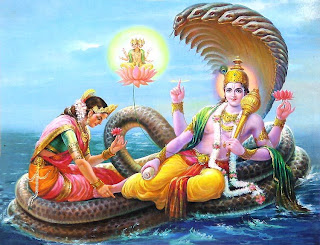Relying on the Name of Shri Ram
bharoso jaahi doosro so karo |
moko to ramko naam kalptaru kali kalyan pharo ||1||
karam upaasan, gyaan, baidmat, so sab bhaanti kharo |
mohi to 'saavanke andhhi' jyon soojhat rang haro ||2||
chaatath rahyo svaan paatri jyon kabhun na pait bharo |
so haaun sumirat naam-sudhaaras pekhat parusi dharo ||3||
svaarath auu parmaarath hoo ko nahi kunjro-naro |
suniyat setu payodhi pashaanni kari kapi katak-taro ||4||
preeti-prateeti jahaan jaakee,tahan taako kaaj saro |
mere to maay-baap dou aakhar, haaun sisu-arni aro ||5||
sankar saakhi jo raakhi kahaaun kachhu tauu jari jeeh garo |
apno bhalo raam-naamhi te tulsihi samujhi paro ||6||
The Kalpavriksha
Whoever relies on someone else can carry on. Whereas for me, solely the name of Ram is the *kalpavrikasha which is blossoming with the fruit of salvation in this Kaliyuga.The bhava is that I have attained love for the *divine just by chanting the name of Ram ||1||
Everything in the Material World Appears Green or Illusory
Although the Vedic principles of karma (action with its fruit and implications of merit),upasana or worship and gyan (understanding of the identity of the self with the ultimate brahman) are all true in every sense. But wherever I look everything seems absolutely green or deceptive just like one blinded by *Savan. (Solely the name of Ram comes to my mind.)
Doing Smarana of Shri Ram Naam
I wandered about licking several leaf-platters( of left over food) but my belly was never full. By doing *smarana of the name of Ram, I can see that the nectar of the gods has been served. (I experienced several godly pleasures but felt no sense of gratification anywhere. And I could not find absolute eternal bliss at any place. By concentrating on Ram Naam now, I can see that the platter of mukti [deliverance from the cycle of birth and death] has been instantly served in front of me; which means that I certainly have a right on moksha, a form of divine ecstasy. I can eat the eatables in the served platter whenever I want. In the same way I can attain moksha or salvation whenever I desire. But I am relishing the rasa of love for Shri Ram, an objective which enlightened (souls) men ardently long for)||3||
A Fantasy or Reality
Ram Naam is effective for my self-interest as well as spiritual evolution (I have attained the selfish motive of mukti or release from rebirth and the supreme wealth of love for god by chanting the name of Ram)This fact is not loaded with the uncertainty of whether it is 'an elephantine fantasy or human reality'.(because I have attained it.)
The Power of the Name of Shri Ram
I have heard that just by the powerful impact of this Name an army of *monkeys made a bridge of stones and crossed over the ocean. ||4||
Goswami Tulsidas is Persistent in Front of 'Ra' & 'Ma', his Parents
Wherever one has love and implicit faith, his task has been accomplished.(According to this principle) the two syllables of 'ra ' and 'ma ' are my parents. I am persistently adamant and restless only in front of them ||5||
Lord Shiva
If I am hiding anything as I speak,then Lord Shiva is a witness that my tongue should burn or rot and collapse. (This is not the figment of a poet's imagination or an exaggeration, but the description of a true condition)I have come to the conclusion that one's well-being can come about solely by chanting the name of Ram.)
kalpavriksh: one of the fabulous trees of Krishna's paradise that grants all desires.
Divine: the Supreme Being esp as equated with Vishnu
Savan: fifth month of the Hindu lunar year, July-August, the rainy season.
smarana:concentrated internal practice of remembering God

















